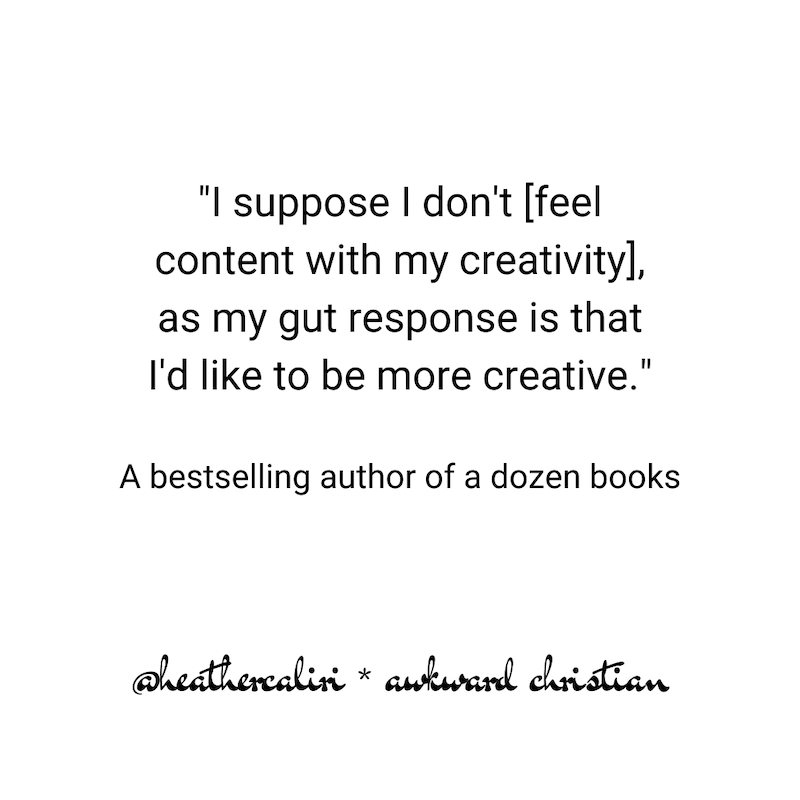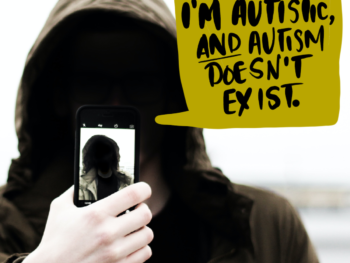
You guys, “creativity” is fascinating. Did you know it was only coined as a word in the 1850s, and didn’t come into common use until the 1900s? And now it’s everywhere.
I wanted to pick the brains of my email subscribers about creativity, and they were so generous in sharing what they know.
Here are some of the results.
Most respondents identified as creative, but…it’s complicated.
I am not neutral on the subject of creativity. To reveal my major biases, I’m of the opinion that all people are creative in some way, and that we should define “creativity” as broadly as possible. For instance: I was very inspired by Angela Garbes’ book Essential Labor where she says caregiving is intrinsically creative.
In my survey, then, I created a list of “creative tasks,” that, along with more traditional pursuits like painting, included caregiving, and ordinary chores like preparing food. After people checked which of the creative tasks on that very broad list they do, I then asked them if they would call themselves “creative” using the list as a guide.
So my bias towards very broad definitions of “creativity” was pretty clear.
58% of respondents identified as creative, and, even with my ridiculously broad definition, 29% still said they weren’t creative. And 14% offered reasons why they had trouble with the question, including feeling like they are creative, but just don’t do creative activities.
I think it’s interesting to note that even pretty extreme levels of skill/success do not mean people feel creative. An ex-cordon-bleu chef said they don’t feel creative because their skill feels “too ordinary.” And a friend who has literally published a dozen books doesn’t feel creative—she said she feels “tension between what I imagine and what I’m actually able to do.”
I’ll let us all sit with that conundrum a bit.
Not feeling creative was a lot about how you define the word
Many people felt like what they do just doesn’t “count” as creativity. Following a pattern, for instance, or not having completely original ideas. Lack of skill or talent was another reason people listed for their alienation from creativity. Finally, people felt “lazy”, lacked motivation, or did not finish projects they started.
Most people aren’t content with their creativity
Only a quarter of people who think they are creative feel content with their level of creativity. That means that the vast majority of people that responded either:
- don’t feel creative or
- don’t think they’re creative enough.
That is a lot of alienation, guys.
Despite the alienation, more than half of creative people feel like creativity is part of their ordinary life.
This made me happy. We might be discontent, but we’re still making stuff.
Most people chose ‘lack of time’ as their biggest creative roadblock.
The next highest roadblocks were money, ability to finish projects, skill, inspiration, and organizing themselves.
Lack of time is a real problem, especially for caregivers, or those with chronic illness. Still, I once argued that it’s not the biggest roadblock we face. (Any idea what my vote is? Go here to find out.)
A few thoughts on the alienation
I was skimming an academic article about the history of creativity here and came across two quotes:
“[in the past 60 years, creativity] grew to be celebrated not only as an individual quality but also as a personal responsibility. People are implicitly expected to cultivate their creative potential to live a successful life and contribute to society.”
“More contemporary associations with creative value move us away from the sphere of individual well-being and health and toward capitalist concerns for production and consumption. Much of creativity’s current popularity is its perceived contribution to the economy and rapidly evolving technology…This market orientation is interested in novelty is interested in novelty…as long as it sells. the whimsy or process-orientation of mini-c creativity is of much less interest…”
I think this is one source of a lot of the alienation I found in my survey. If we can only be successful if we fully develop and optimize our own creativity (and not in a whimsical or non-goal-oriented way), then being creative is like flossing: the kind of stuff that “good” adults do.
It also doesn’t really sound super fun, even if we “should” do it.
I think market forces and capitalist assumptions are part of this. Am I a “real” author if I have not published a book with a publisher? If my books only sell 200 copies? Is my art real if no one buys it? What if it only sells for $10, or the person who pays me for it is related to me? Does that count?
You might scoff at these questions but I have asked myself variations on these themes and usually decided what I do does NOT count.
The question “what counts” is foundational to creative contentment, guys. You’d think more skill or success or whatever answers the question for you, but you’d be wrong. I have interviewed a NY Times bestselling author about this question and you would be surprised at how complicated her answers were.
I am working on a new ebook about redefining creativity to be radically inclusive. Subscribers will get at least part of the book for free (still working out my plan!) Sign up here to get it when it launches. Or, share this post with a friend.



